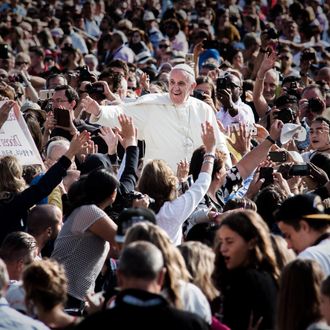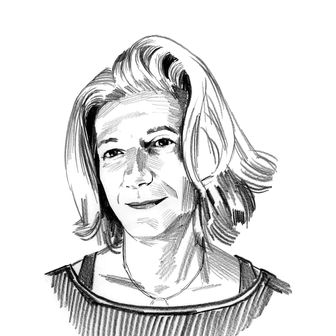
One reason you can tell Pope Francis is a political and rhetorical genius is that he is able to tell the Christian story (arguably the most-told story in the Western world) as if it were new again — and not just new, but radical. Disruptive, even. He’s spent a lot of the last year turning heads and forcing double takes, but most of the time he’s been merely offering Christian truths, the same ones preached by countless bishops throughout the ages and memorized by a billion youthful catechists. Francis has been less a revolutionary theologian than he might seem, but who can remember another Christian leader whose interpretation of the gospels seemed at once so relevant, so moral, so contemporary, so wise? Not since Billy Graham has a singular pastor seemed to speak to so many.
When speaking on issues beyond theology, Francis has employed a similar strategy — apply familiar Catholic values to vexing contemporary matters and wait for the world’s knees to buckle. His message last week about the refugee crisis in Europe was a very good example: When he shamed all of Europe for responding with insufficient urgency and generosity to the needs of the millions flooding there, mostly from Syria, his message was galvanizing — even though he said nothing, really, that any compassionate Sunday-school teacher wouldn’t say. He urged the developed countries of Europe to show their concern for the displaced masses in deeds, not just words, and he commanded Catholics to do the same, asking “every parish, every religious community, every monastery, every sanctuary of Europe take in one family, starting with my diocese of Rome.” These words — together with a photo of a toddler, drowned and facedown in the sand — made obvious what should have been obvious all along. Caring especially (and not additionally or incidentally) for the homeless, the stranger, and the victimized should be every Christian’s priority.
The genius was in Francis’s timing — and his deft use of the spotlight shining constantly on St. Peter’s Square — and in the refusal to engage in dithering or equivocating, two specialties of politicians, not priests. The geopolitical bickering that has ensued since last week — Who will take how many? Who will take the Muslims, too? — only serves to elevate Francis more, for he, the luckiest of all statesmen, is able to make pronouncements without fear of political or electoral consequence. He is elected by God, after all — who else is more suited to speak moral truth? There is bravery in his confidence — he is no one’s puppet — and that’s part of his genius, too. Among those watching him there is a kind of relief in seeing a moral issue treated as one.
Looking back at his record, you see that advocating for refugees is not only not new, but it’s also been a refrain for Francis throughout his pontificate, and even before. Jorge Bergoglio thinks of himself as an immigrant — part of a large Italian family forced south, whose fortunes fell dramatically due to political and economic forces beyond its control. His first trip beyond Rome as pope in July 2013 was to the Italian island of Lampedusa, where migrants frequently die as they endeavor to reach Europe from North Africa. We have lost a sense of “brotherly responsibility,” he said at the time. “We have forgotten how to cry.” In September of that year — two full years ago — Francis said that empty convents and monasteries, abandoned since the priesthood has ceased to be a career path, should be given over to immigrants instead of being converted to hotels and condominiums: “The word solidarity frightens the developed world,” he said.
Just three months later, in December — again from his pulpit in St. Peter’s Square — Francis chastised Europeans for failing to see the immigrants and refugees in their midst as fully human, for allowing them to be second-class citizens, disenfranchised and even bought and sold and treated as slaves. In a gesture, he included in this condemnation “the hidden exiles,” the elderly and the sick who are excluded from their own families. Jesus, he reminded his listeners, was an immigrant, too, born to a couple who were forced from home and had traveled a long distance and were looking for any kind stranger to host them for a night.
When he arrives in the U.S. for the first time in his life next week, Francis will again make immigration and refugees his priority, in an election season when the issue is particularly charged. Jeb Bush is a moderate on immigration reform, but some of his Catholic fellow candidates are not: Rick Santorum wants to eliminate birthright citizenship, and Bobby Jindal talks about needing “high walls and a narrow gate” on the Mexican border. Obama is hoping this papal visit will give his immigration proposals a push.
Ever conscious of optics, Francis initially wanted to start this trip on the Mexican border, but that proved logistically difficult. But in Washington, D.C., at Catholic Charities, he will speak to a group of homeless people, and in East Harlem, New York City, at Our Lady Queen of Angels School, where 70 percent of the students are Hispanic and 20 percent are black, he will meet with children from immigrant families. He will address the United Nations, where he will likely talk about poverty and bad governance as the roots of the migration crisis, and he will address Congress — and who knows what he will say there. But the pope travels to Congress at the invitation of House Speaker John Boehner, a proud Roman Catholic, who has dithered and deflected on the subject of immigration reform for years. If Francis’s past actions are any guide, he will take Boehner and his Republican brothers and sisters to school for their pigheaded-ness — and he will do it in the name of love.






























